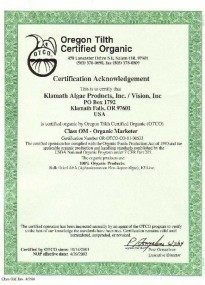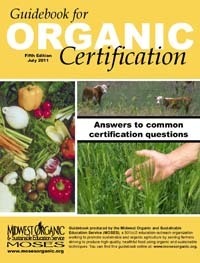Organic Certification Cost Share Program
Minnesota’s organic certification cost share program is now accepting applications!
Often I hear that farmers decide to not certify because of the cost, and when I tell them about the federal cost share program — which can rebate up to 75 percent of the cost of their organic certification — they were not aware of it. If you are a supporter of an organic farm, you can support them but letting them know about this opportunity. Farmers: this is a federal program, check with your state’s department of agriculture to learn their process and timing.
Organic certification is a third-party verification system that assures consumers that the organic products they buy are truly organic, produced in compliance with federal organic regulations. Organic operations are monitored through review of their records and on-site inspections at least once a year. Additional benefits of certification include, sending a clear message to the USDA — farmers are growing organically and consumers are buying it, legal protection for farmers, and protection from co-opting.
“The cost share program provides some regulatory relief from a financial burden that is unique to organic farms and other organic businesses,” said MDA Organic Program Administrator Meg Moynihan. “Organic growers and processors who sell more than $5,000 of organic agricultural products are legally required to obtain certification at their own expense. Depending on the farm or business size, the cost ranges from hundreds to thousands of dollars per year, so this program can be a big help.”
Funds for the cost share program come from a cooperative agreement with the United States Department of Agriculture (USDA). Operations that received certification (or had ongoing certification) between October 1, 2011 and September 30, 2012 are eligible for reimbursement of up to 75 percent of certification-related costs up to a maximum of $750 per category (crop, livestock, processing/handling, wild harvest). Last year, the MDA disbursed nearly $381,000 to 480 certified organic farmers and processors in the state.
To qualify, applicants must be certified by a USDA-accredited certifying agency. The MDA has already mailed application packets to more than 900 certified organic operations in the state. Any certified organic farmer or processor who did not receive a packet can obtain all the program details and necessary materials on the MDA’s web site www.mda.state.mn.us/organic or by calling 651-201-6012. Deadline: October 31, 2012.
1) Certification Sends A Clear Message To The USDA
(Reposted from July 30, 2012, Organic Certification Supports And Protects Farmers And The Organic Movement)
Farmers are growing organically and consumers are buying it. The USDA tracks the number of certified organic farms. A growing, quantifiable number of certified organic farms is a strong indicator that organic production is viable: that farmers are achieving it, that consumers want it, and that organic must be supported with research, farm support payments, insurance, and cost share funds. Certification supports the organic movement and is a crucial element in the transition to an organic agricultural system.
2) Certification Provides Legal Protection.
Every certified organic farm has an Organic System Plan (OSP)—unique and specific to their individual farm. As an inspected, certified, and federally registered document, an OSP is a respected and credible document in a court of law. Without certification, production claims and statements are hearsay and unconfirmed in a court of law.
1. Chemical Trespass: Minnesota organic farmers Oluf and Debra Johnson had success in 2011 when the Minnesota Court of Appeals ruled that an organic farm surrounded by chemical-laden conventional farms can seek damages for lost crops, as well as lost profits, caused by the illegal trespassing of pesticides and herbicides on its property.
2. Eminent Domain: In 2006 our organic farm succeeded in a legal proceeding against one of the largest privately owned company in the world, Koch Industries. Because the farm—Gardens of Eagan—was certified, we were able to prevent a crude oil pipeline from crossing our organic fields, and work with the Minnesota Department of Agriculture and the Minnesota Public Utilities Commission to create and implement an organic mitigation plan providing protections to all certified organic farms in Minnesota. Certification was crucial to this success.
3) Certification Provides Protection From Co-opting
As the market grows, more conventional and industrial companies and farms are developing “local” and “sustainable” products with glorious labels, professional promotion plans, and prices far lower than any small, organic farmer can produce. Organic certification is crucial to differentiate product and protect farmers and consumers alike from this green washing and eroding of the local and sustainable market.

Interested in growing organic? Start here!
MOSES ORGANIC CERTIFICATION GUIDEBOOK.
This 36-page guidebook will answer your questions about organic certification! From general production questions, to a discussion on approved materials, this guidebook is an indispensable resource.
The guide includes listings of:
1. Steps to Certification
2. Certification Agencies
3. Helpful Organizations
4. Resources for Transitioning
5. Organic Research
© Atina Diffley 2012
Subscribe to Atina Diffley’s Blog, What Is A Farm?
Read Turn Here Sweet Corn| Amazon | Barnes & Noble | IndieBound | University of MN Press
Atina Diffley is an organic consultant (Organic Farming Works LLC), educator, public speaker, and author of the 2012 memoir, Turn Here Sweet Corn: Organic Farming Works, published by the University of Minnesota Press. Until 2008, she and her husband Martin ran the Gardens of Eagan, one of the first certified organic produce farms in the Midwest. One of her favorite things in the world is rain.

What Is A Farm? A Synthesis of the Land, People, and Business.
- Atina Diffley's profile
- 12 followers




